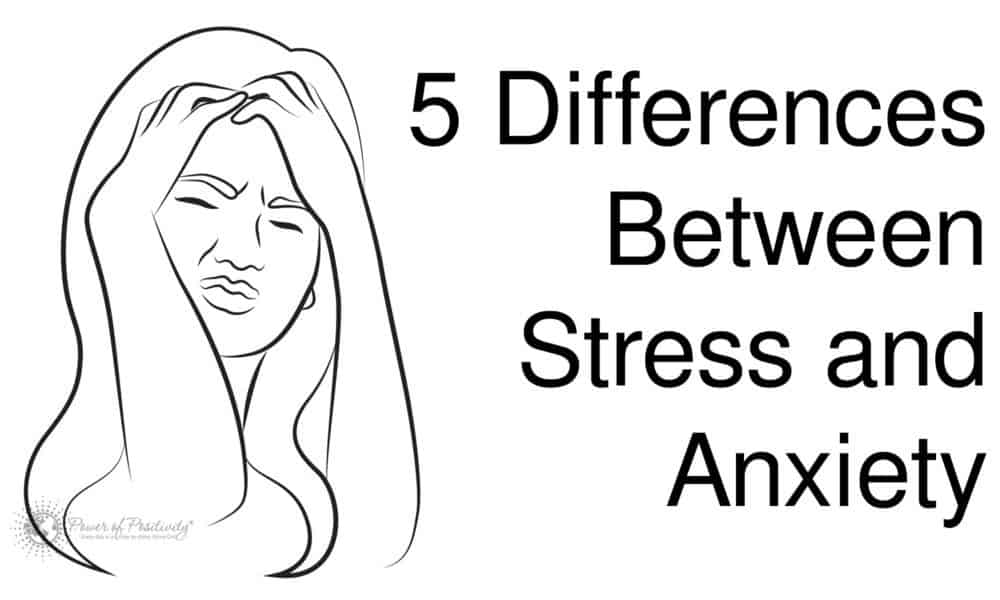5 Differences Between Stress and Anxiety

Sure bad things happen to everyone, but when it comes to how
you feel about it, is it stress or is it anxiety, or is there really any
difference at all? There actually is a difference, even though the emotion behind the response is the same.
In this article, we will explore the 5 ways that stress is different from anxiety and what, if anything, you can do about it.5 Differences Between Stress and Anxiety
We all have worries, and that is normal. What is not considered a healthy mental state is to be worrying more than not. A state of chronic worrying is a negative pattern of thought that psychologists can help you learn how to break.Chronic worriers are at risk for health problems due to prolonged stress response by the body. When we experience stress, our bodies release the stress hormones cortisol and adrenaline.
These high stress hormones cause your blood pressure to increase, your heart rate to increase and other psychological changes that, over a long period of time, lead to a shorter life span. In a British study on stress and mortality, researchers found that stress can lead to a higher risk for death by cardiovascular disease, cancer, heart attack and stroke.
1. You over-respond to minor life stress
Researchers who study the differences between stress and anxiety call stress, ‘life stress,’ because it is usually in response to the minor daily annoyances of life. For example, spilling your coffee on the way out the door in the morning is a life stress event.If you experience a minor life stress moment like this and respond like it’s the end of the world, you are blowing a small thing up into a major reason to be upset that has ruined the rest of your day. This is a negative thought pattern of someone who has not learned to manage stress well.
Related article: 7 Warning Signs of Anxiety
Someone with an anxiety disorder was worried about the possibility of spilling their coffee, being late to work, being made fun of by their coworkers, etc. before the coffee ever spilled. It’s the chronic, continuous worrying that is more likely to be a trait of someone with an anxiety disorder.
2. Do you believe there is something you can do to change things, yes or no?
Whether or not you believe there is anything you can do in response an event or not to regain control over your mood and your life is one major difference between stress and anxiety. You do have the power to create positive change, no matter what has occurred that is stressful, and if you believe this about yourself, then you are just experiencing a life stress event and not anxiety.Feeling out of control, like your life is something that happens to you, not something that you can control with your thoughts and actions is a difference between an anxiety mindset and a normal one.
Related article: 8 Behaviors That Create Anxiety (And How To Avoid Them)
Researchers studying this difference found that ‘individuals who perceive themselves as having little control over environmental events are more likely to respond to a life change with symptoms of and depression and anxiety.
3. You rarely stop worrying
When worrying has become a normal part of your life and it continues for months, it is likely that you have developed an anxiety disorder. Chronic worrying for 6 months or longer is one of the criteria for diagnosis for an anxiety-related diagnosis.4. You have some concerns about how much stress you feel
The intensity of the stressful feelings, the physiological feelings in your body that stress is associated with, or your thoughts that you can’t seem to turn off; if your stress is concerning to you, it is likely developed into an anxiety problem.5. Your life is different because of your worries
Making changes in your life because of stress is one difference between stress and anxiety. This can look different depending on the cause of your stress but if you avoid people, places or events because of your stress about them, this is likely an anxiety problem.When the fears, or the fear of being stressed out is the reason you no longer socialize with friends, go to special events that you used to enjoy, or you are noticing that your work productivity has decreased, this is more likely to have progressed from a stress problem to one of anxiety.
The Anxiety and Depression Association of America says ‘Everyone experiences stress and anxiety at one time or another. The difference between them is that stress is a response to a threat in a situation. Anxiety is a reaction to the stress.’ Anxiety is chronic stress, whereas stress is a normal response to something upsetting. Then again, we can avoid both by choosing to respond with acceptance and putting on a positive mindset as we face this new challenge, but that’s a topic for another article.
No comments:
Post a Comment